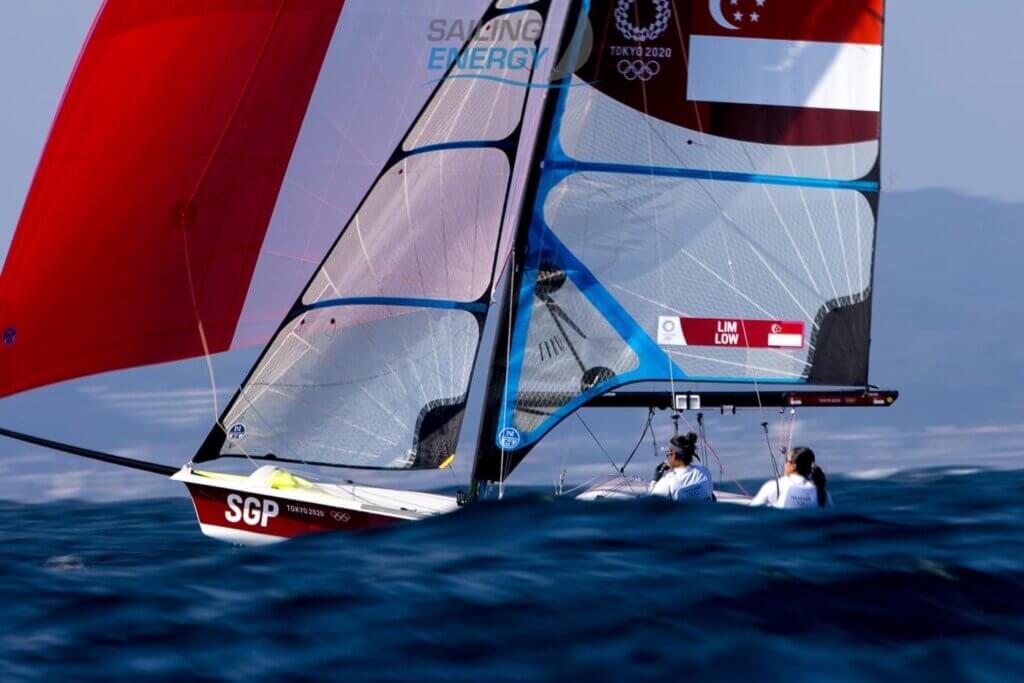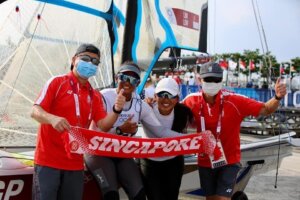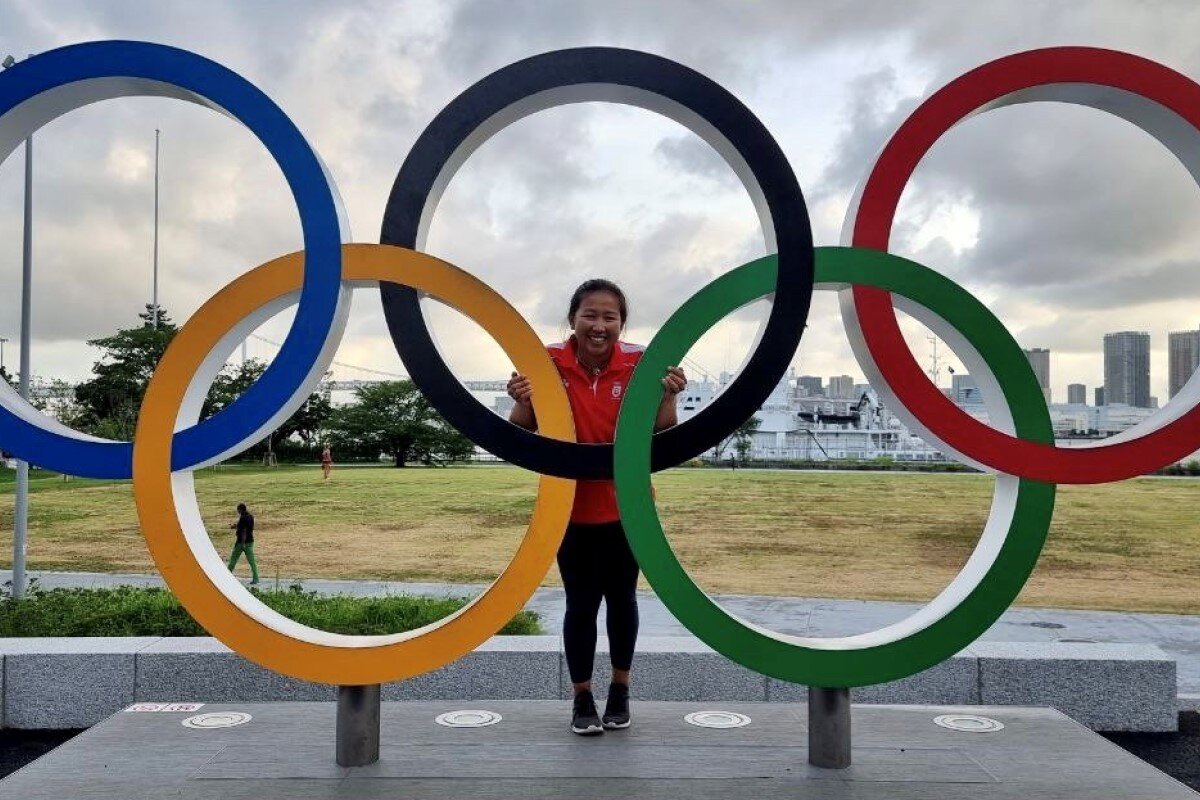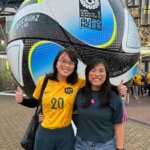Feature Image: Kimberly at the Olympics Village / Photo Credit: Kimberly Lim
By the SMU Digital Marketing Team
One would think that participating in the world’s highest level of sporting competition would warrant a much-deserved break. But having freshly returned from the recent Tokyo Olympic Games, Kimberly Lim has re-donned her student cap to start a new semester at SMU. The SMU School of Accountancy (SOA) undergraduate has just put Singapore on the sailing map – finishing 10th with her partner Cecilia Low in the 49er FX medal race, and is already eager to return to the classroom.
“It’s actually been quite nice returning to campus and I do enjoy school,” says Kimberly, who finished as part of Asia’s top pair in the competition.
Revealing that she’s always liked numbers, the multiple Asian Games medallist admits she is a little nervous about picking up where she’s left off – Kimberly took a Leave of Absence (LOA) to prepare for her debut at the Tokyo Olympics. “I haven’t spent much time looking at my school materials as I was busy with sailing. My whole world was just focused on my sport.”
One bright side of last year’s Circuit Breaker period was that Kimberly found the time to complete some course readings when she was back in Singapore, while waiting on the postponement decision for the Olympic Games. “Back then we never knew when we could travel again, which made it hard to plan for anything else. So it was good for me to keep working on other areas to give my mind a little breather.”
Asked if she misses her SMU course mates or professors, Kimberly candidly shares that most of her classmates would have already graduated due to her LOA. “Even my juniors have graduated,” she laughs. But she shares that the staff at SMU SOA do check in with her every now and then, asking about her training and if she might need to extend her LOA. “Those periodic checks were always nice.”
And while she will soon be preparing for the 2022 Asian Games, for now, she is aiming to complete her studies and graduate.
We chat with Kimberly on her first day back on campus to find out more about her debut at the Olympics, get a behind-the-scenes look at her days in Japan and learn how sailing has made her into the resilient and tenacious person she is today.
How did you get started in sailing?
I started sailing as a CCA at the age of 10 when I was in CHIJ Katong Primary. To be honest, I only gave it a go because my elder sister was already in the co-curricular activity. I actually had quite a fear of sailing initially and almost chose ballet over it. But with my family’s support and encouragement, sailing grew on me and I haven’t looked back since.
Can you share more about your Olympics journey?
This dream to perform on the Olympic stage began when I was 15, and it’s definitely been a long journey, but I truly treasure every moment of it – the good and the bad. Each moment has shaped me into the person I am today, helping to get me to this level.
And I wouldn’t call it sacrifices per se, but rather the choices I’ve had to make to achieve my goals, such as being based in Portugal to train for the last four years, away from family and friends and putting school on hold.
Of course, I missed my family and friends, and the food. Portuguese food is lovely, but it’s not the same; likewise, with friends. I have good friends in Portugal, but it’s never the same.
When you’re an athlete, sometimes you wonder what it would be like to have a normal life: where you get to go to school and enjoy different activities; doing what your friends do. But because athletes don’t have time on our sides, we tell ourselves to enjoy the unique life that we have. Because we are living something that is very extraordinary and special.
So while there might have been some tough decisions that I’ve had to make, I would do it all again if I had to.
What were some of the challenges you faced?
I was already spending a lot of time sailing when I started at SMU. In fact, I was not able to be in school much during my first three semesters.
When it comes to sailing, unfortunately, the conditions in Singapore aren’t always conducive. So I was always either away in Portugal for training or travelling around Europe or to the US to take part in competitions. That really took a toll on me as I had to deal with the differences in the time zones each time I came back.
Actually, this was the deciding factor for me. I remember being at one of my competitions and thinking about my exams, which ended up affecting my sailing. These small thoughts were always in the back of my mind, and they kept me from giving my all in the event. I told myself that if I wanted to do a campaign, I wanted to do it well, with no regrets. And that’s when I decided to switch my focus to sailing.
You’ve had to ask SMU for time off to focus on your sailing. How has the university supported you in your academic and sporting ambitions?
The university has been absolutely supportive of my sailing pursuits over these last seven years. The professors have always been very nice; and the staff at SOA would always check in with me to see if I’m doing alright.
When I told them that I needed to take a LOA, they were extremely supportive of me and my idea. In fact, it’s the first time I’ve ever heard an educational institute telling their student that their sport should come first. I was equally happy and surprised when they told me, “This is the time for you to put sailing first.”
Thank you SMU and SMU School of Accountancy!

Kimberly and race partner Cecilia Low in action at the Tokyo Olympics sailing event / Photo Credit: Sailing Energy
We’re sure that many are curious as to what it was like to compete at the Olympics, could you share how your time in Japan was like?
It was amazing! I enjoyed every moment of it – just being there and soaking in every moment, absorbing the good days and even the bad ones. I was definitely fulfilling a dream. The whole experience felt surreal and still does.
In the Games Village, it was massively huge so it could get a little overwhelming. But as part of the sailing team, I wasn’t in the main Olympic village, so unfortunately I didn’t get to meet all the big names in sports like Simone Biles, Sunisa Lee and Naomi Osaka. I did miss the hype and experience that the other athletes had. But it all worked out, because where we were – the Enoshima Sailing Village, the atmosphere was calmer and I could focus on my event without too many distractions.
Actually, I think we were lucky because we got a really nice accommodation near Oiso – along the coast and 40 minutes away from Enoshima island where the sailing events took place – for our stay. The best part was the view. Our rooms had full-glass windows with a gorgeous sea view to wake up to every morning. In fact, I felt calm every time I walked into the room.
How has Covid-19 made the Games different?
With Covid, there were a lot of regulations. For one, we were constantly wearing our masks, until we touched the water and launched. And when we got back on land, we put on our masks again. There were also those shields between people during meal times at the canteen.
There were other rules that we had to follow as well, like making sure you stayed in your bubble, which is the group of people you socialise with. For the Singapore team, it was the four Singapore sailors, our physiotherapist, our coaches, our psychologist and our manager. And because every athlete wanted to do well, we did our best to keep within our bubbles. This made the sailing village really safe – we didn’t have any Covid cases during the competition. I also had to do a test every day, which I got used to after a while.
The downside was not being allowed to leave the Sailing Village at all except to go to the competition venue. But it kept us focused on our events, so it wasn’t too bad.
Injuries are part and parcel of an athlete’s life; how did you keep yourself in top condition during the Olympic events?
The journey has been a long one, I’ve been working for the past five to seven years to get to the Olympic Games. But during that time, what stifled my growth was that I kept getting injured in the early years, and that did take a toll on my progression.
In fact, at one point, my sailing partner and I seemed to take turns to get injured. It was not just impact injuries, but also wear and tear from how much we were putting our bodies through. I’ve injured my back, knee, hip and even feet. In addition, I’m hypermobile, which means my joints are more flexible than most people, so I also tend to get impingement injuries. Emotionally, it made me a little fatigued because it felt like I was always taking two steps forward, and one step back.
Over the years, I’ve learnt from these lessons and have a better grasp of what I need to do to keep myself in top form. Now, I make sure that I do a lot of strengthening exercises especially for the small muscles, as well as practising self-regulation, which means that I don’t overdo my training – a common problem amongst athletes.
You have to believe and trust in yourself that you’ve done the best you can, and not let the what-ifs and should-haves hinder you. It’s important to learn more about yourself so you know when to pull back and when to push forward.

Kimberly (second from right) with race partner Cecilia Low and Minister Edwin Tong (left) and Chef de Mission Dr Benedict Tan (right) / Photo Credit: Kimberly Lim
How did you prepare yourself mentally? Were there any setbacks that you had to overcome during the Olympic Games?
During the games, the first two days were a little bit challenging, especially on the second day, when we struggled to keep pace with the fleet. We couldn’t do what we wanted to do. We kept trying new things, but nothing seemed to work. And there was a moment my partner and I wondered if we were letting this Games slip by.
We had a rest day after the second day of competitions, which allowed both of us to regroup and re-focus. We both decided not to dwell on what had passed, and instead look forward to the upcoming race the next day.
That day off was much needed. I slept well, had breakfast then did a small gym workout to keep my body activated, had lunch and then took a nap. Basically, I spent the day recovering and making myself happy and calm, in order to be fresh for the next day.
The motto I tell myself is: Don’t believe the odds are against you because of what has happened in the past.
Do you think the mental resilience and perseverance you’ve developed from sailing has helped you in your studies?
For sure, the first thing you learn is time management and how to prioritise your time. That skill has definitely carried through and it gives perspective when dealing with the things at hand. It gives me more focus and availability to do more when I’m in school.
I’ve also learnt how to be adaptable because, in sailing, there are so many uncontrollable elements. These uncertainties keep you on your toes, but it also teaches you to adapt to changing situations, and not get flustered. Though unlike being out in the open waters during a competition, I actually feel more in control for a change when I’m in school – where the environment feels a lot more controlled and I don’t have to be constantly on my toes.
With sailing being a dynamic sport, you’re constantly challenging the elements, opponents and yourself. And besides adaptability, it also encourages open-mindedness, which when in school, it reminds me to be receptive to learning new things and widening my scope of knowledge.
Moreover, like any other sport, you’ll face victories and losses, which in turn inculcates resilience, perseverance and grit, among others.
If you weren’t representing Singapore in sailing, what do you think you might pursue instead?
This is a hard question. When I was 10, I tried both ballet and sailing. And if you saw me back then, you would probably be surprised that I chose sailing because I didn’t like going outdoors much. So I guess if I had to choose something besides sailing, maybe I would be doing ballet instead. But I’m glad I made the call to do sailing. It’s been a true blessing.










